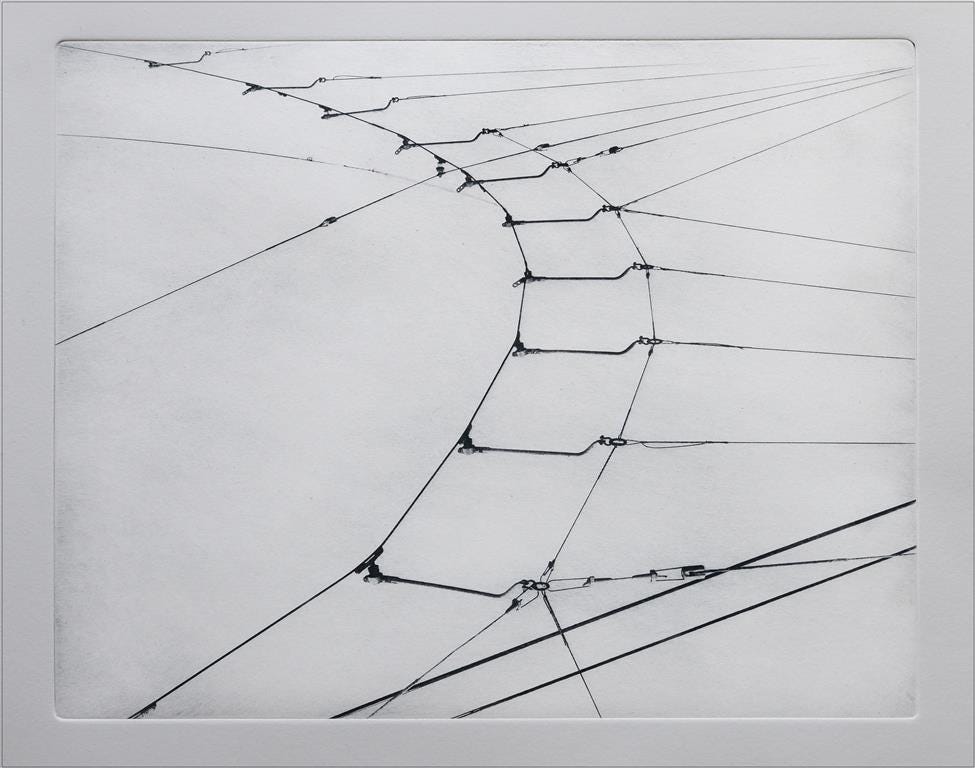Future Works
John Reed and Xu Zhangrun
A friend who lived and died in the foggy Sunset District of San Francisco occasionally added flowering plants to the weeds that grew abundantly around his house. The neighborhood is Chinese and low-rise, near the ocean, and still has the aspect of sand dunes and Philip Marlowe's San Francisco. I mentioned to my friend that fuchsias do well in foggy climates, and that they attract hummingbirds. Justlikethat he said 'I have seen the fuchsia, and it woiks!', putting-on the perfect proly patois of an upper-West-Side denizen transplanted to the other coast.
American journalist John Reed, author of Ten Days That Shook the World, had taken himself to the newly formed Soviet Union in 1917, whereupon his exclamation about how gloriously the Communist future works electrified comrades back home. For 72 years, right through the long-awaited demise of the Soviet Union in 1989, and afterward, Americans believed 'It can't happen here'. And yet, in the third decade of the 21st century, it did. What the Soviet Union failed to do, despite the best efforts of several highly placed agents in the U.S. Government, the Chinese Communist Party (CCP) accomplished. It takes more than a few spies to turn a nation, the CCP reasoned. After all, what's in it for an ex-spy? They can sell their secrets to the highest bidder, but that's risky, and besides, secrets quickly become obsolete. Or they can fabricate third-hand fantasies, like Christopher Steele and his 'golden showers' pee tapes,
but even those have a limited shelf life, as Steele discovered when pleading with the FBI to let him do a re-run (though the FBI reluctantly agreed). No, it was far smarter to widen the recruiting pool beyond the ideologically motivated, and engage the professional and career interests of the marks. So the CCP added professional career inducements to standard-issue bribery, extortion, and honey traps. They wanted, what's the word?, sustainability. This, a real advance in the practice of statecraft, ensured that the people working on behalf of the CCP could persuade themselves that their career advancement was really in their own, and (consequently) everyone's best interest. With exquisite sensitivity to what matters in each sphere of life,
the CCP contrived superior investment performance for Wall Street, exotic Oriental themes for Hollywood, scholarly prestige for academia, and possession of coercive powers for the future occupant of the White House and those who manage him.
For government officials who seek total control of the citizenry, Communist China provides the apparently successful working model that John Reed foresaw in the Soviet Union of 1917. Schooled in the 'Young Leaders' program of Klaus Schwab's World Economic Forum globalist curriculum, graduates learned to shift their career aspirations from mere nations to the entire planet, even as they fanned out to occupy key positions in national governments.
Saving the planet from rampant carbon-burners, making the world safe for anal sex, and injecting experimental drugs into a clueless populace was more important than catering to the demands of deplorables. No time for debate -- this is an emergency!
Officials of U.S., U.K., European, Canadian, Australian, and New Zealand governments -- once known as the Western democracies -- watched in awestruck admiration as hazmat-suited People's Liberation Army herded millions into an urban concentration camp. The scene in Wuhan was played over and over again on Western newscasts, especially the episode at 5':30" showing a couple being forcibly dragged out of their apartment into quarantine.
'So efficient', Western officials told themselves -- except it didn't work. But they copied it anyway, which worked to enhance the domain of officialdom, if nothing else. Little noticed in the rush of the moment was that every expansion of government reduces the scope of freedom correspondingly. And so, inevitably, free speech and criticism became intolerable to them. Not because free speech and criticism had increased, nor in the absurd formulation of the 'fact-checkers', because it 'violated community standards', but simply because the little-noticed expansion of the government domain of action enabled officials to suppress it.
Western officials and experts for whom the slightest criticism rankles aspire to the CCP's near-absolute power over citizens. For now, however, Western officials have to content themselves with deputizing private companies to police communication. Big-tech companies cooperate out of fear that their status as neutral platforms could be revoked, opening them up to lawsuits just like any other publisher. It's a clumsy method of censorship, though, slower than the lightning-like dissemination of embarrassing facts, like the fact that government spies are actually directing the censorship. Every Western government, now staffed with people who have passed through 'post-modernist', then 'non-judgmental', then 'politically-correct', then 'critical (hate-whitey) race', then 'woke' curricula, aspires to put the ideologies they were indoctrinated with into practice immediately, without opposition. To glimpse the future of the Western former democracies, imagine the Western admiration of CCP-style total control continuing unchecked. But we don't have to imagine it: Consider the experience of Xu Zhangrun, a former professor at Tsinghua University.
N S Lyons draws our attention to a letter Xu Zhangrun wrote to his daughter forewarning her what to expect upon her return to China from Australia. Xu Zhangrun had criticized the governance of Xi Jinping, in the mildest possible terms of a traditional 'Letter to the Throne' suggesting practical reforms for the common good. For this he was fired, his license to teach anywhere in China was revoked, his pension was canceled, he was evicted from his apartment, and prevented from receiving donations. Some of these sanctions may be familiar to those in U.S. and U.K. universities who have dared to observe that boys and girls are biologically different, but clearly the CCP is more thorough about removing its perceived enemies. Xu Zhangrun, very much aware of how thorough the CCP can be, agonizes in his letter about the responsibility he feels for having probably blighted his daughter's career. For a distinguished Professor of Law, and classical Chinese scholar, deeply committed to his own professional career, he understands all too well the difficult choices his daughter must make at the very beginning of her professional life. His letter conveys the fear and terror endemic in a regime that brutally suppresses all opposition, and also his courage in setting his sights beyond his present troubles. Xu Zhangrun's letter to his daughter, 'From My Anguished Heart', is translated and annotated by Geremie R. Barmé.
Those in America and the West who are in the John Reed mold might temper their admiration of total state control with an unbiased look at the actual consequences. They might then have a chance to enjoy watching the hummingbirds at the fuchsias a while longer.





